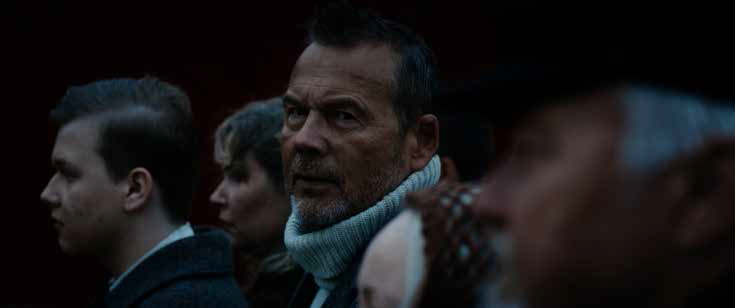(THIS ARTICLE IS MACHINE TRANSLATED by Google from Norwegian)
Feature films about the Second World War have become a form of their own blockbustere in Norwegian film: lavish productions that reproduce dramatic events from the days of the war, told according to a preferably 'Hollywood' storytelling model with the aim of reaching a wide audience. A Norwegian filmmaker who does not fit into this tradition, but who has dealt equally with the same war in large parts of his filmography, is Knut Erik Jensen. At the age of 83, he can be called one of Norwegian film's real – and highly distinctive – veterans. Now he is back in Norwegian cinemas with the feature film Longing for the present.
Personal starting point
Audio feature filmmaker Jensen is best known for the trilogy Stella Polaris (1993) Burned by frost (1997) and When the darkness is over (2000), of which the dialogueless feature film debut Stella Polaris excels in particular. With these films he established his experimental and distinctive film style, which can be described as a form of poetic and impressionistic modernism. Longing for the present is Jensen's first feature film since Iskyss (2008), which was a fictionalized narrative based on Gunvor Galtung Haavik's life. After this, however, he has directed the portrait documentary The acute person (2011) about Mads Gilbert, as well as several shorter films.
Throughout his extensive career, Jensen has made a number of short films, documentaries and series. He was associated with NRK for a long time, where, among other things, he made the Amanda-winning documentary series Finnmark between east and west (1986). In 2001, he had enormous success with the cinema documentary Heftig og begeistret, which he followed up with On the wings of song the following year and the related On hau in the sea in 2004.
Jensen was born in Honningsvåg in 1940, and many of his films depict events from Finnmark during and in the aftermath of the Second World War. So too Longing for the present. In a short video introduction that is shown before the cinema screenings, the director talks about his personal starting point for the film, which is a kind of reproduction of his own memories and experiences from the war years and the subsequent time in the region. Worth noting, however, is that Jensen believes that the film takes place in present tense. One can debate whether this should be interpreted completely literally, as the scenes in the film undeniably depict events from many years ago – albeit in a subjectively rooted flow of memories, associations and dreams. Jensen's point, however, is rather that war is a condition that lives on in those who have experienced it. And that the topic's topicality has persisted in all the years since this specific war.
Dreamlike flow of action
Longing for the present follows a young woman, played by the filmmaker's daughter Ellinor Lilja Haug Jensen, who is evacuated from Honningsvåg when the northern areas are subjected to the occupying power's 'scorched earth tactics' – after which only the church is left in the home. Among the other actors are Ellen Dorrit Petersen, Per Kjerstad, Stig Henrik Hoff, Hege Aga Edelsteen and the artist Morten Traavik. In line with Jensen's unconventional form and narrative style, which looks more towards Eastern European than towards American film tradition, the film does not necessarily convey any clear action that is suitable to be reproduced here. Instead, it moves through a dream-like flow of scenes, impressions and moods, detached from classical chronology and dramaturgy.
Just as fully depicts Longing for the present forced evacuation, refugee existence and liberation, as well as Norwegian participation in the Winter War and enlistment on the side of the Germans – something that also becomes part of the subsequent trauma among the population. The narrative uses several symbols, with a piano being the most prominent. There is generally little dialogue here – and when the characters talk to each other, the lines are often heard as narrator voices, rather than the actors saying them directly to each other. This move – which can be found in several of Jensen's films – can also be interpreted in a more symbolic direction.
The film moves through a dream-like flow of scenes, impressions and moods, detached from classical chronology and dramaturgy.
However, the film also contains some archive material, including frequent features from Filmavisen, which add relevant context.
Russian paradox
The Red Army's role in the liberation of Finnmark during the Second World War belongs to this context. The relationship with Russia has been another central theme in Jensen's films – and perhaps it is timely to remind us of the decisive effort Russian (as well as other Soviet) soldiers made in this context. At the same time, the historical paradox of Russia's position today, as an attacking party in an ongoing war of invasion, is inevitably highlighted.
Jensen has allegedly worked to realize Longing for the present ever since his previous feature film from 2008. The film was produced without production support from the Norwegian Film Institute's feature film schemes, but through, among other things, public funding, private financiers and the regional Filmfond Nord Nord-Norsk Filmsenter. Parts of the film have first manifested as individual short films – speaking enough for a non-traditional and obviously not easy financing model.
As can be seen, the viewing public should not Longing for the present expect some typical Norwegian Second World War film. Nevertheless, we should be grateful that Jensen is still active as a filmmaker. In the ongoing writing of history on Norwegian film screens, he is an important, unique and highly uncompromising voice, of whom one can yearn for more in our present.



